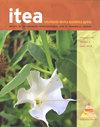冬季荷斯坦公牛的马绒毛膜促性腺激素(ECG)会改变睾丸激素水平,但不会改变生殖活动
IF 0.4
4区 农林科学
Q4 AGRICULTURE, DAIRY & ANIMAL SCIENCE
引用次数: 0
摘要
本研究的目的是评估激素马绒毛膜促性腺激素(eCG)对荷斯坦幼犬睾酮浓度、性行为和精液质量的影响。选择21头12±3个月大、活重350±17kg的公牛。他们被分配到以下三个处理:T1=500IU的eCG(n=7);T2=1000 IU的eCG(n=7),T3=对照(盐水;n=7。在实验持续期间,每周进行eCG的给药。治疗对睾酮浓度有影响(p<0.05),接受500 IU eCG的公牛睾酮浓度更高,其次是接受1000 IU eCG的公牛。eCG对座头数量的影响只有一个趋势(p=0.09),与对照组(2.23±0.32)相比,接受500 IU(2.78±0.35)和1000 IU(3.29±0.35)的公牛更高。对于应用eCG的一周的影响,除了对第一、第二、,以及第三次交配。总之,eCG的应用增加了雄性激素的浓度,但不会影响冬季幼公牛的性活动和精液质量。本文章由计算机程序翻译,如有差异,请以英文原文为准。
La gonadotropina coriónica equina (eCG) modifica los niveles de testosterona, pero no la actividad reproductiva, en toros Holstein durante invierno
The objective of the present study was to evaluate the effect of the hormone equine chorionic gonadotropin (eCG) on testosterone concentrations, sexual behavior and seminal quality in young Holstein gona- bulls. Twenty-one bulls of 12 ± 3 months of age and 350 ± 17 kg of live weight were selected. They were assigned to the following three treatments: T1 = 500 IU of eCG (n = 7); T2 = 1000 IU of eCG (n = 7) and T3 = Control (saline; n = 7). The administration of eCG was performed weekly during the period that the experiment lasted. There was an effect of the treatment ( p < 0.05) on the concentration of testosterone, being higher for the bulls that received 500 IU of eCG, followed by those that received 1000 IU of eCG. There was only a trend ( p = 0.09) of the effect of eCG on the number of mounts, being higher for bulls that received 500 IU (2.78 ± 0.35) and 1000 IU (3.29 ± 0.35) compared to the control group (2.23 ± 0.32). For the effect of the week of application of the eCG, an effect ( p < 0.05) was observed on each of the variables of sexual behavior, except for the reaction time to the first, second, and third mating. In conclusion, the application of eCG increased the concentration of testosterone, but without affecting sexual activity and seminal quality in young bulls during the winter season.
求助全文
通过发布文献求助,成功后即可免费获取论文全文。
去求助
来源期刊

Itea-Informacion Tecnica Economica Agraria
农林科学-农业经济与政策
CiteScore
0.90
自引率
0.00%
发文量
15
审稿时长
>12 weeks
期刊介绍:
ITEA publica artículos que hagan referencia a los distintos aspectos de las ciencias agro‑alimentarias, cuyo contenido sean resultados obtenidos, descripción de métodos, técnicas o materiales, presentación de nuevas ideas, etc.
 求助内容:
求助内容: 应助结果提醒方式:
应助结果提醒方式:


